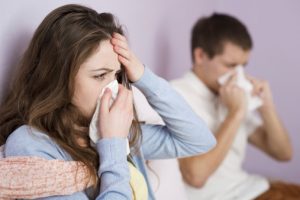
As many of us are quite aware, with the winter comes an increased risk of illness. And yet, even though we know that the odds of catching a cold or flu during the winter are at their highest, it still doesn’t stop us from partaking in habits that can increase these odds even more.
Advertisement
You can catch a cold or a virus through the spread of germs or by catching the influenza virus. Unfortunately, despite the fact that these illnesses are very much preventable, we still carry on with the unhealthy habits that land us in bed for days, stuffed up, coughing or even worse – running to the bathroom to vomit or have diarrhea.
No one enjoys being sick; it takes you away from friends and family and makes you feel horrible overall. For those reasons alone, it is important to quit those habits that can increase your risk of being sick and change them to cold- and flu-fighting habits instead. Here are six ways you’re increasing the odds of becoming ill this winter, and what you can do about them.
6 ways you’re increasing your risk of illness
You don’t wash your hands…properly
 Just because your hands are wet and you rub some soap between your fingers quickly, it doesn’t mean you have truly washed your hands. Handwashing is a process and if not done correctly, it can still very well be the cause of germ spreading and sickness. By washing your hands properly, you can actually reduce your risk of illness by at least 16 percent – that could be the difference between being at home ill or still out and about.
Just because your hands are wet and you rub some soap between your fingers quickly, it doesn’t mean you have truly washed your hands. Handwashing is a process and if not done correctly, it can still very well be the cause of germ spreading and sickness. By washing your hands properly, you can actually reduce your risk of illness by at least 16 percent – that could be the difference between being at home ill or still out and about.
The trick to proper hand washing is to lather the soap for at least 20 seconds. If soap and water isn’t available, antibacterial sanitizer is still 60 percent effective at reducing your risk of illness.
Essential moments when hands should be washed include:
- Before and after caring for a sick individual
- Before and after preparing food
- Prior to eating food
- After taking out the garbage or recycling
You touch your face
Our hands touch everything – hand rails, elevator buttons, and even other people’s hands – so when you touch your face you’re putting the day’s germs all over it. This can be particularly harmful because your face has many areas where germs can enter and lead to illness. So many of us touch our faces unknowingly, but we really must become more aware of this dirty habit.
Therefore, a quick and easy way to reduce the risk of illness is to stop touching our mouths, nose, eyes, and face in general to prevent the spread of germs.
You’re not getting enough sleep
 Whether you stay awake intentionally or simply can’t sleep, those hours awake are working against you. Sleep is an integral part of health as it helps restore the body and boost the immune system. When we don’t sleep we unwillingly weaken our immune system, which is the body’s first line of defense against illness. Essentially, poor sleep means a frail immune system, which means you can get sick more easily.
Whether you stay awake intentionally or simply can’t sleep, those hours awake are working against you. Sleep is an integral part of health as it helps restore the body and boost the immune system. When we don’t sleep we unwillingly weaken our immune system, which is the body’s first line of defense against illness. Essentially, poor sleep means a frail immune system, which means you can get sick more easily.
If you often intentionally stay awake, try quitting that habit because you don’t have much to gain from being a night owl. If you are having trouble sleeping, speak to your doctor to receive a diagnosis and proper treatment for the disorder.
Your workplace allows sick people
It’s common practice that employees who are sick still trek themselves into work but really what’s the point? Not only do they feel crummy and get hardly any work done, but they increase the odds of other employees getting sick as well.
A study found that one sick employee can spread germs in a communal office area within four hours – that’s just half a day at work!
If you’re sick, be nice to your fellow co-workers by staying home, and encourage others to use their sick days as needed.
You shake hands
Although polite, shaking hands can spread germs – fast. Research suggests that hand shaking accounts for 80 percent of illness spreading. Try to avoid shaking hands and opt for a fist bump or a smile or nod instead. Additionally, you could tell a small fib by saying that you have a slight cold and don’t want to spread germs around – they don’t need to know that you’re just trying to protect yourself. You have the right – it’s your health!
 You’re always stressed
You’re always stressed
Like lack of sleep, being chronically stressed has similar health effects and can weaken your immune system. One study showed that chronically stressed people double their risk of getting sick compared to non-stressed individuals.
With the hustle and bustle of life – especially around the holidays – take time out for yourself to unwind and relax, your body will appreciate it.
Related Reading:
Winter heart attack risk increases in cold weather
Snow shoveling in the cold weather can increase heart attack risk. Not only can winter be dreadful thanks to dropping temperatures and less sunlight, but we are also forced to spend time outdoors shoveling the continuously growing pile of snow. Already a tedious task, snow shoveling can also prove to be dangerous as it increases the risk of heart attack. Continue reading…
Advertisement
Sleep deprivation: Linked to common cold and weak immune system
The team involved in the study reports that when exposed to the common cold virus, people who get only six hours of sleep a night (or less) have a higher chance of catching a cold than those who get seven or more hours of sleep every night. Continue reading…
Sources:
http://www.prevention.com/health/6-ways-youre-asking-cold
